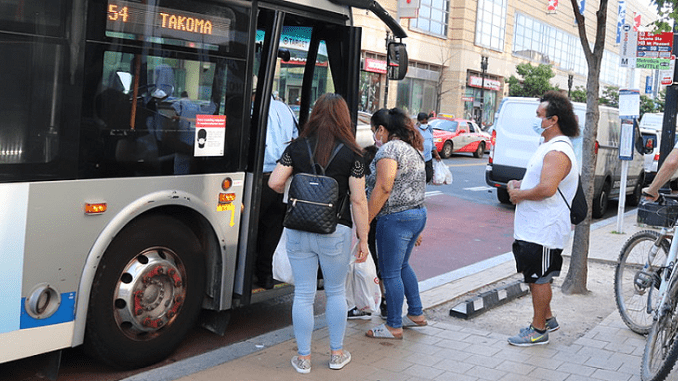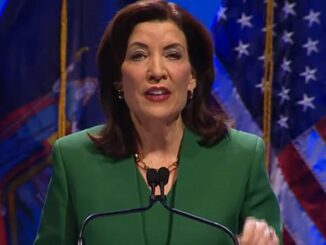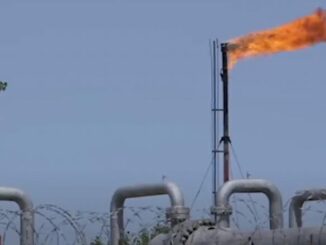
WASHINGTON, DC, May 20, 2022 (ENS) – Coming together as the Metro Electric Bus Coalition, public health, environmental, and faith groups are pressuring the new Board of Directors of the Washington Metropolitan Area Transit Authority, WMATA, to scrap the plan the previous board approved last June in favor of electric buses.
The coalition wants to replace it with a plan that accelerates the transition to an all-electric bus fleet to serve the 5.4 million residents of the U.S. capital city with quieter, cleaner vehicles.
But politics prevails in the Washington, DC world of public transit as in all other areas of life in the U.S. capital city.
The Metro Electric Bus Coalition is not alone in its support of electrification. Last year, 48 elected officials, including four members of the U.S. House of Representatives, and more than 30 Maryland state legislators also urged Metro to replace half its nearly 1,600 fossil-fueled buses by 2030 at the latest.
“The previous Metro board did not have the information it needed to make an informed decision about the future of the Metrobus fleet,” said Steve Banashek, the electric vehicle chair for the Sierra Club’s Virginia chapter, a coalition member.
“In light of our analysis of the staff’s deficient plan, the new board should direct the transit agency to fast-track its electric bus procurement schedule, which – as it now stands – would condemn DC metropolitan area residents to decades of fossil fuel bus pollution,” Banashek said.
Six of the current eight board members were not involved in developing the existing plan. To see bios of the current Board of Directors, click here.
So, the coalition provided the new board with a memo explaining how fossil fuel buses threaten public health and the climate, and an analysis of the plan the staff presented to the previous board, revealing its inaccuracies.
Today, WMATA operates more than 1,400 buses that run on a version of alternative fuel that is less harmful to the environment than diesel, including compressed natural gas, advanced technology diesel fuel, and ultra-low sulfur diesel fuel.
But further progress to decarbonize the bus fleet has been slow. The schedule adopted by the previous board has electricity powering fewer than 20 percent of Metro’s 1,595 bus fleet in 2030, the same year the Los Angeles transit agency, with its 2,320 buses, and Houston’s transit agency, with more than 1,230 buses, plan to have all-electric fleets.
Elsewhere across the country, the New York City Metropolitan Transportation Authority with 5,920 buses, the Chicago Transit Authority running 1,864 buses, and King County Metro in Seattle with its 1,600 buses, are scheduled to be all-electric by 2040.
If Metro sticks to the schedule adopted last June, the Washington, DC fleet will not be fully electric until 2045.
“We recommend that the new board direct Metro to buy only electric buses from now on,” said Tim Oberleiton, senior attorney with Earthjustice’s Right to Zero campaign, another coalition member. “That would enable the Metro to electrify 45 percent its fleet by 2030.” Earthjustice is a public interest environmental law firm with offices in Washington, DC and across the country.
New WMATA Leader Chosen

This summer, Metro will get a new general manager with impressive recent experience in providing a city with electric buses.
WMATA selected Randy Clarke, the current president and CEO of Capital Metro in Austin, Texas, following an exhaustive nationwide search, including stakeholder and public input.
Clarke led the successful effort of securing one of the country’s largest financial voter-approved referendums for a transit expansion. The initiative, Project Connect, experienced a multi-billion-dollar infusion for its capital program, including electric buses.
The Metro Electric Bus Coalition recommends that Washington Metropolitan Area Transit Authority:
- – Stop buying fossil fuel buses after the last of the fossil fuel buses are delivered from its 2018 contract with New Flyer, move expeditiously to complete its electric bus pilot project, and then, during its next five-year procurement cycle from fiscal year 2024 through fiscal year 2028, buy only electric buses. Metro should install electric bus charging infrastructure at bus garages in all three jurisdictions to accommodate the purchase of 100 electric buses annually.
- – Cancel its plans to
1) increase the percentage of compressed natural gas (CNG) buses in the fleet,
2) build a new CNG fueling facility at the Shepherd Parkway garage, and
3) expand the Bladensburg garage’s capacity to fuel more CNG buses. The elected officials. too, oppose expanding Metro’s reliance on methane. - – Cancel plans to install new diesel-related storage tanks and infrastructure at the Northern Bus garage and only house electric buses there after the renovation is complete.
“It makes no sense for Metro to spend millions of dollars on new diesel infrastructure that will become a stranded asset,” said Taalib-Din Uqdah of the Northern Bus Barn Neighbors, a coalition partner. “We have had enough of diesel bus noise and pollution.”
- – Initially deploy electric buses at garages in low-income and environmental justice neighborhoods to ensure the buses benefit area residents who are disproportionately harmed by smog and other transportation-related air pollution.
“Major transit agencies across the country are facing similar challenges as Metro,” said Elliott Negin of the Union of Concerned Scientists, another coalition member. “But unlike Metro, they are addressing those challenges head on and have ambitious plans to electrify their fleets as quickly as possible. There is no reason why Metro cannot do the same.”
“The UN Intergovernmental Panel on Climate recently issued a report that said that to keep average global temperatures from going up any more than 1.5 degrees Celsius – the pledge that nearly 200 nations made in the Paris climate agreement – global carbon emissions will have to drop 45 percent this decade,” said Oberleiton, the Earthjustice attorney, “Metro has to do its part.”
In February, the Washington, DC Council echoed the coalition’s recommendations, unanimously adopting a resolution calling on Metro to electrify “at least 50 percent of its bus fleet by 2030.”
“Going forward,” the Council’s resolution states, “Washington Metropolitan Area Transit Authority must buy only electric buses.”
Featured image: WMATA Bus Stop along 14th at Irving Street, NW, Washington DC, June 18, 2021 (Photo by Elvert Barnes Photography)



